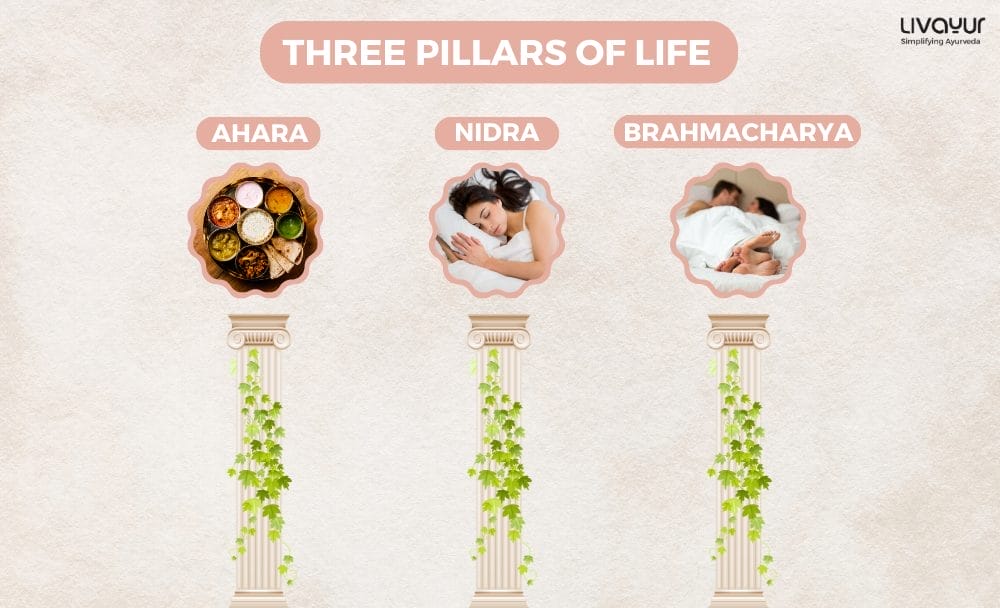According to Ayurveda, the health and happiness of a person depend on the three pillars of life, namely food, sleep and sexual activity. These pillars are the sub-pillars or Trayopasthambas that support the three main pillars or Stambhas of the body (the three Doshas). They are essential to increase longevity, prevent diseases and keep the body, mind and spirit in harmony.
The Three Pillars of Life
Ahara (Diet)
Ahara, or diet, is the first pillar of life that supports the main Stambhas of the body, namely Vata, Pitta and Kapha. The balance of these three Doshas largely depends on the food we consume, whether it is in solid, semi-solid or liquid form.
According to Ayurveda, our body is the final product of Ahara. Food is essential to carry out digestion through which our body extracts the nutrients from the food and produces Ojas, the subtle energy required for strength, immunity and happiness. Hence, a proper Ahara ensures the growth of the body, whereas an imbalanced and improper Ahara invites diseases and disorders in the body.
Ayurveda has given a detailed description of the proper Ahara and its effects on the human body. It has classified foods into three categories, namely Satvik, Rajasik and Tamasik, each with its own set of qualities and characteristics. Out of these three categories, Satvik is considered the most nutritious food for your body. Physiologically, Ayurveda has also divided food into six tastes or Rasas (sweet, sour, salt, pungent, bitter and astringent). The Rasas you should eat highly depend on the Dosha imbalance of your body, and therefore, eating foods according to Rasas can help pacify the aggravated Doshas in your body.
Nidra (Sleep)
The second pillar of life is Nidra or sleep. Sleep is vital for your overall well-being as your body uses sleep as an opportunity to heal, repair and rejuvenate your tissues. According to Ayurveda, happiness and sorrow, proper and improper growth, strength and weakness, all depend on the quantity and quality of your sleep. An inadequate, imbalanced or irregular Nidra can adversely affect your health.
Both excessive and insufficient sleep are considered unhealthy. Taking less or inadequate sleep can aggravate your Vata Dosha and lead to weaker tissues in the body. On the other hand, excessive sleep can vitiate Kapha Dosha and cause lethargy, stagnancy and immobility. Therefore, one must take proper, regular and adequate amounts of sleep.
The best way to regulate your sleep cycle is by aligning it with the circadian rhythms. Ayurveda states that one should sleep early and wake up before sunrise to stay healthy and happy.
Brahmacharya (Abstinence or Regulated Sex):
According to Ayurveda, the third pillar of life is Brahmacharya or sexual activity. Ayurveda states that when sexual activity is conducted appropriately, it helps boost youthfulness, memory, strength and hormonal balance in the body. However, when it is indulged excessively or in an inappropriate manner, it can deplete your Shukra. Shukra is the body tissue that can procreate and is extremely important for producing Ojas, the vital energy required by the body. A depletion in Shukra can lead to insufficient Ojas, making the body more susceptible to diseases and disharmony.
Ayurveda mentions many rules to regulate sexual activity. It says that a person should indulge in sexual activity based on their Dosha constitution. While a Kapha body type can have intercourse frequently, a Vata body type should restrict the frequency of their sexual indulgence.
Ayurveda also mentions that a person should abstain from having sexual activity till a particular age to preserve their Shukra. For males, the recommended age for having sex is between 20-25 years, whereas, for females, the recommended age is 12-16 years. Seasons also play a major role in the frequency of your sexual activity. Out of the six seasons, winters is considered best for having frequent sexual activities.
Takeaway
The three pillars of life are vital to the health and happiness of a person. One should always try to manage these pillars as a way of self-care. By eating a balanced diet, sleeping adequately and indulging in sexual activity appropriately, you can improve longevity and prevent many diseases.























